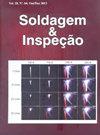Thermal Dissipation Effect on Temperature-controlled Friction Stir Welding
IF 0.3
4区 材料科学
Q4 METALLURGY & METALLURGICAL ENGINEERING
引用次数: 11
Abstract
Abstract During Friction Stir Welding (FSW) of complex geometries, the thermal dissipation, induced by geometric features or the surrounding environment, may strongly affect the final weld quality. In order to guarantee a consistent weld quality for different conditions, in-process welding parameter adaptation is needed. This paper studies the effect of thermal dissipation, induced by the backing bar thermal conductivity, on the weld temperature and the temperature controller response to it. A new temperature sensor solution, the Tool-Workpiece Thermocouple (TWT) method, was applied to acquire online temperature measurements during welding. An FSW-robot equipped with temperature control, achieved by rotation speed adaptation, was used. AA7075-T6 lap joints were performed with and without temperature control. The cooling rate during welding was register plus macrographs and tensile tests were assessed. The controller demonstrated a fast response promoting the heat input necessary to maintain the set welding temperature. The results demonstrated that temperature control using the TWT method is suitable to achieve higher joint performance and provides a fast setup of optimal parameters for different environments.温控搅拌摩擦焊的热耗散效应
摘要在复杂几何形状的搅拌摩擦焊接过程中,由几何特征或周围环境引起的热耗散会严重影响最终焊接质量。为了保证不同条件下焊接质量的一致性,需要对焊接工艺参数进行自适应。本文研究了由衬条导热系数引起的热耗散对焊接温度的影响以及温度控制器对其的响应。提出了一种新的温度传感器解决方案——工具-工件热电偶(TWT)方法,用于焊接过程中的在线温度测量。采用转速自适应实现温度控制的fsw机器人。AA7075-T6搭接在有和没有温度控制的情况下进行。焊接过程中的冷却速率记录了宏观图,并进行了拉伸试验。控制器显示出快速响应,促进了维持设定焊接温度所需的热量输入。结果表明,采用行波管方法进行温度控制可以获得更高的联合性能,并且可以快速设置不同环境下的最优参数。
本文章由计算机程序翻译,如有差异,请以英文原文为准。
求助全文
约1分钟内获得全文
求助全文
来源期刊

Soldagem & Inspecao
工程技术-冶金工程
CiteScore
1.00
自引率
16.70%
发文量
13
审稿时长
12 weeks
期刊介绍:
The Journal Soldagem & Inspeção (S&I) js a techno-scientific journal created in 1995. Printed issues of this journal are distributed free of charge to libraries in Brazil, Latin America and the Iberian Peninsula. It has been printed regularly every quarter since September, 2002, and, since the beginning of 2007, its electronic version is available in the address: (http://www.abs-soldagem.org.br/s&i/). The journal is sponsored by the Brazilian Welding Association (ABS).
Since its creation several well known professionals working in welding contributed with the Journal Soldagem & Inspeção and its editorial board crosses the Brazilian borders. During its evolution the Journal received ta special contribution from the Editors-in-chief : Ronaldo Paranhos, Américo Scoti, Paulo Modenesi e Alexandre Bracarence. Since January 2012 the Editor-in-chief is Ana Sofia C. M. D’Oliveira, Full professor at Universidade Federal do Paraná (UFPR) . Her work focus mainly on Hardfacing and Physical Metallurgy. The jornal Soldagem & Inspeção also counts with 10 Associate Editors and a fix Editorial board of referees. short-term (Ad Hoc) referees can be invited to evaluate some papers submitted to the journal.
The Soldagem & Inspeção journal is the scientific divulgation channel of the Brazilian Welding Association (ABS). It aims to publish original papers related to the scientific and technological development of welding, inspection, and related fields. Review papers or letters on current and controversial subjects are also published in the Journal.
Its abbreviated title is Soldag. insp. (Impr.), which should be used in bibliographies, footnotes and bibliographical references and strips.
 求助内容:
求助内容: 应助结果提醒方式:
应助结果提醒方式:


